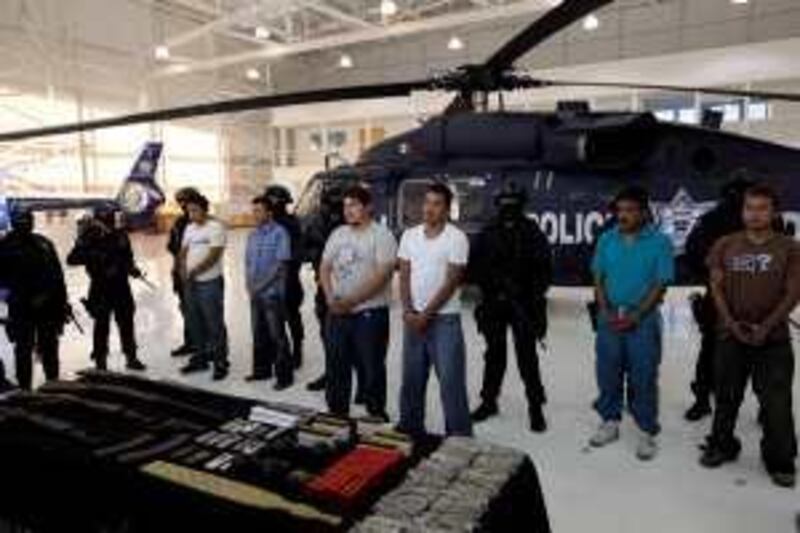DENVER, COLORADO // It was a top-secret, four-year operation that spanned 19 US states and targeted one of the world's most ruthless and eccentric drug cartels. Three thousand agents from state and federal law enforcement agencies swooped in simultaneously on members of La Familia last week, arresting 303 members of the cult-like Mexican gang who had been running the group's drug distribution networks across the United States.
Over the course of the 44-month operation, authorities also seized more than US$32 million (Dh118m), 1.25 tonnes of methamphetamine, nearly two tonnes of cocaine, approximately 7.25 tonnes of marijuana, and 13 kilograms of heroin. The US attorney general, Eric Holder, called Project Coronado "unprecedented - the largest ever undertaken against a Mexican drug cartel". It surely will not be the last. Analysts say eight years of war in Afghanistan and Iraq caused Washington to take its eyes off a rapidly deteriorating situation just south of the border with Mexico, where by some counts 11,000 people have died in a spiraling drug war.
The five largest Mexican cartels are extending their tentacles into US territory, the main market for their narcotics and their central source of weapons. In addition to tightening border security, Barack Obama, the US president, has pledged to stem the flow of US guns across the Rio Grande. Meanwhile Felipe Calderon, the Mexican president, has deployed the army to fight drug gangs in cities across the country.
Last week's takedown of La Familia members probably represents just the tip of the iceberg. "Mexican cartels are in every state and operate in 230 cities in the United States," said George Grayson, an expert on Mexican drug gangs at College of William & Mary in the state of Virginia. Their gang members have penetrated cities from Seattle, Washingon, to Dallas, Texas, and Atlanta, Georgia, just as Colombian smugglers did in Florida in the 1980s, taking advantage of major airport hubs and hiding among large populations of Hispanic immigrants.
"In Atlanta these days, you can't swing a dead cat without hitting someone connected to a Mexican drug gang," Mr Grayson said. La Familia, based in the south-western Mexican state of Michoacan, is of particular concern, according to US authorities, because of the unprecedented level of violence the gang commits and its large market share in illicit drugs. "This organisation, the newest of Mexican cartels, is directly responsible for a vast majority of the methamphetamine pouring into our country across our south-west border," said Michele Leonhart, the acting administrator for the US Drug Enforcement Administration.
Added Mr Holder: "The sheer level and depravity of violence that this cartel has exhibited far exceeds what we have, unfortunately, become accustomed to from other cartels." In September 2006, La Familia burst into the limelight when 20 masked gang members stormed a nightclub in Michoacan, fired shots in the air and then tossed five severed heads on to the dance floor. The desperados left behind a message, scrawled crudely onto a scrap of cardboard, that read: "La Familia doesn't kill for money. It doesn't kill women. It doesn't kill innocent people, only those who deserve to die. Know that this is divine justice."
Leaders of La Familia, which formed in the 1980s as a vigilante force to protect local citizens from street crime and police corruption, justify their narcotics trafficking by portraying themselves as Robin Hoods who take from rich North Americans and give to the Mexican poor. But when law enforcement closes in, La Familia reacts with extreme violence. Last summer, Mexican authorities arrested several key members of the gang, and they retaliated within a month by kidnapping, torturing and murdering 12 Mexican police officers. In response, Mr Calderon deployed 5,500 soldiers to Michoacan.
The state is home to a bloody feud between the leading Mexican cartels, all seeking to control the lucrative trafficking corridor between Michoacan's Lazaro Cardenas port and the most populous region of Central Mexico. La Familia has control over the port, and has bribed or intimidated the majority of state officials in Michoacan. As the raids were carried out last week in the United States, Mexican authorities on Thursday arrested six Familia members, including two mid-level commanders.
None of those arrested in the United States were senior figures in the organisation, according to US law enforcement agents. Instead they were low-level operatives who oversaw city distribution networks of street-level dealers and gun-smugglers. Mr Holder said the sheer number of arrests would seriously disrupt the cartel's distribution system in the US. Project Coronado "has dealt a significant blow to La Familia's supply chain of illegal drugs, weapons, and cash flowing between Mexico and the United States", he said. "We will not allow these cartels to operate unfettered in our country, and with the increases in co-operation between US and Mexican authorities in recent years, we are taking the fight to our adversaries."
foreign.desk@thenational.ae






